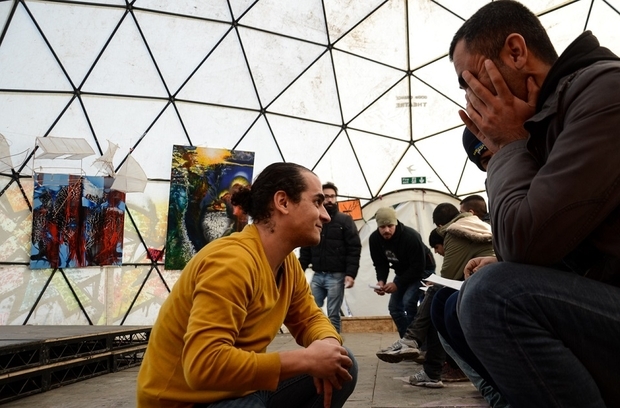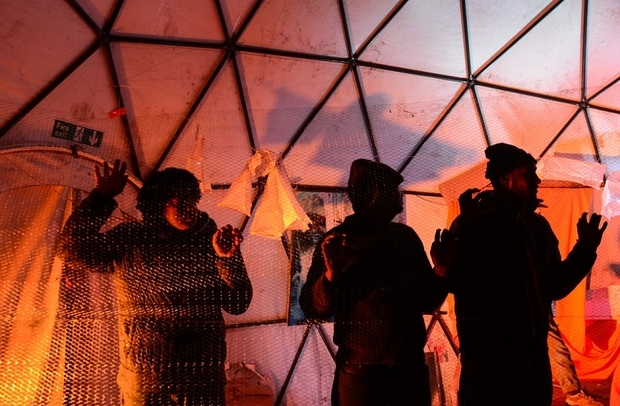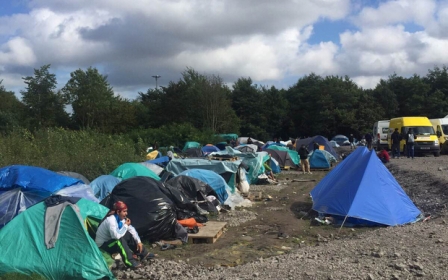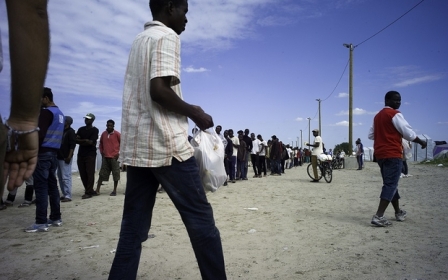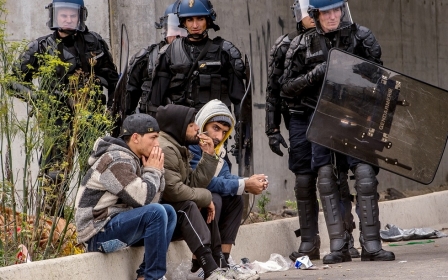Calais' theatre of hope
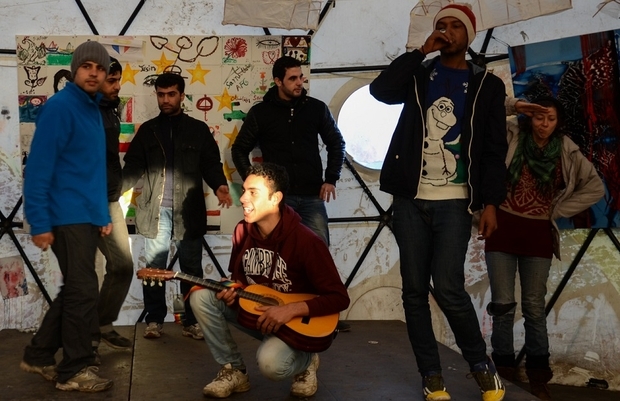
CALAIS, France - "Abbass khalas, aatini chance" ("cops enough, give me a chance") chanted a Sudanese trio on the stage of the Good Chance theatre on New Year's Eve, in the heart of the so-called "New Jungle" in Calais.
They are separated from the audience of fellow refugees by a fence. While on stage they suddenly learned that the conditions for heading to England are good that night, so they had to move quickly. Two of the men got off the stage and managed to sneak under the fence topped with barbed wire, but the third man was injured. Yet they knew they had to abandon him if they wanted to reach the shore of the United Kingdom. They emerged on the other side of the fence, screaming with joy in the middle of an audience composed of Afghan, Eritrean, Sudanese, Pakistani, Kurdish, Syrian, Palestinian and Iranian migrants, asylum seekers as well as British and French volunteers that had gathered for the new year celebrations.
Pretending to be journalists, some refugees take part in an acting exercise, take to the stage holding cameras and fake cardboard cutouts of microphones, and start asking the audience questions about their opinions of the Jungle. A hubbub of intermingled Pashto, English, Arabic and Farsi can be heard inside the theatre’s dome as the New Year celebrations begin.
Junaid Sarieddeen, a member of the Lebanese theatre collective Zoukak, who organised social theatre workshops with Omar Abi Azar alongside the Calais migrants during a whole week, speaks out: "How do you say chaos in Pashtu?", he asks Mohammed, an Afghan who speaks both Pashtu and English.
Laughter echoes in the room. "Chaos is beautiful tonight. This theatre is the freest of all European theatres. It is filled with energy. Use this energy to build your future," he said to the crowd of people who have fled conflict, injustice and poverty and ended up stranded in the muddy industrial area of Calais, separated from England by impassable rows of barbed wire fences.
'The theatre is not a diversion'
Under the dome of the Good Chance theatre, built three months ago by British volunteers, the New Year was celebrated each time the clock struck midnight by each one of the countries represented in the Jungle. It was an opportunity to sing, dance and speak nonstop, as wars brought together survivors from around the world in this unhealthy refugee camp in northern France where some 4,500 migrants and asylum seekers are currently staying.
But the New Year’s Eve festive atmosphere did not fool the people staying in Calais. From the outset and on the first day of the theatre’s workshop that was organised at the beginning of the last week of December 2015, an Iraqi Kurd told the audience in an impassioned tone: "For us, the new year is just a number that changes. Our lives are always at the same dead end." The next day, Mazen, a thin Sudanese guy, was rapping on the stage of the Good Chance theatre saying: "Do not tell me happy New Year - I do not want your pain killer."
Junaid Sarieddeen and Omar Abi Azar did not come to Calais to introduce theatre to migrants and help them escape the hard reality: "We came to give a chance to migrants to listen to each other and, at the same time, put their often tragic personal experiences in perspective. The theatre is not a way to divert their attention from their terrible reality, rather it is a tool to put things in perspective and detect new creative solutions," they explain while sitting in an Afghan restaurant made of wood and tarpaulins not far from the theatre.
Community theatre
The Good Chance theatre was originally initiated by two young British playwrights, Joe Robinson and Joe Murphy, who wanted to see for themselves what they had been reading about in the media every day on Calais. "We came in August, confused about what was happening on our border. We did not want to just go and write a play in London.
"Creating a space for expression here made more sense: everyone wants to talk about what they left behind, their journey and hopes. We built the theatre and outlined its programme with the migrants: the dome belongs to the community," says Joe Robinson to Middle East Eye while eating some spiced eggs and warm Afghan bread, his eyes fixated on a stuffed tiger wearing a Christmas hat.
What precisely drew the Good Chance theatre founder to Calais was the creative outpouring of the Calais jungle: "The jungle is a humanitarian disaster, but it is also a place of hope and unconventional creativity, with restaurants and shops built from scratch and a unique sense of community," he said after spending three months sharing the daily life of migrants in Calais.
From waiting time to the creation time
It is a kind of creativity that can fade quickly if nothing is done to keep it alive: "When we arrived, we saw young joyful people whose minds were gradually disintegrating while waiting, with a sense of shame not to have achieved their objective to reach England," the founder added.
Under such conditions, creating a theatre seemed to be a natural and logical step for the Zoukak association members who came for the first time in September to prepare their work: "This place is based on a ‘waiting for’ dimension; waiting for humanitarian assistance; waiting to head to England; or waiting for a response to the asylum demand in France. It is thus a frustrating situation that is passive, whereas theatre is based on action. We are offering them a chance to do something creative during this waiting period," said Junaid to MEE.
Every day participants of all nationalities were hosted under the dome, and three-hour-long collective theatre exercises were proposed to Afghans, Kurds, and Sudanese who were both young and old, timid or too talkative, before giving a performance every night for the diverse jungle audience.
Since its inception in 2006, Zoukak often provides therapy through its theatre workshops, whether it is in juvenile prisons, or with female victims of domestic violence in Palestinian refugee camps of Lebanon, or alongside those displaced from war. But the technique they have forged over the years by combining clinical psychology and theatrical experimentation, requires specific conditions not met in Calais. "The goal of the therapy through drama is not to heal, but to secure spaces for self-expression, leading the participants to embody their fears or their joys and find a distance to be able to better address their problems," explains Omar.
"But here, we cannot create that safe space because the Good Chance theatre is an open place where migrants continue to come in and out of," says Junaid. "You can have three people at the beginning of the workshop and 50 in the end! For us, this is very similar to the workshop we organised in 2008 in northern Lebanon after the destruction of the Palestinian refugee camp of Nahr el-Bared, following the fighting between the Lebanese army and jihadists. The camp’s inhabitants had then moved to another Palestinian camp, Beddawi, where we stayed for almost a month. Again, we got to play with 200 children at once. In Calais, we never know if the workshop participants will come back again for the evening show. However, what is important is not the outcome but the process itself."
'The theatre is made for such situations'
Every day the process gives amazing results. There is mutual respect among participants, each speaking their own language, and waiting patiently to hear another participant's poem translated or a song interpreted into their language. It is as if they know they are going to learn something about themselves through listening to their neighbour.
"What we do here is closer to social theatre, inspired by the Augusto Boal method. The idea is to make a group theatre, listen to each other, to express themselves and integrate different individuals in a group," explains Omar and Junaid. One day, they prepared the stage and migrants were to play the role of journalists visiting the Jungle. They say they were stunned by how a mute Sudanese [migrant] was received and welcomed by the rest of the group.
The reversing of roles allowed the migrants to express themselves about their own fate. Between the excellent interpretation of Noureddine, a former Afghan journalist who fled the repression of the Taliban, and that of Rahim, a former Afghan police officer who participated in all the workshops, a mute reporter delivered vital information using facial expressions and hand gestures talking about the cold, the mud and the tear gas, which are all crucial problems in the Jungle.
Bathed in the vibrant atmosphere of the camp, where about 200 volunteers, mostly British, struggle to improve the migrants’ every day life, Omar and Junaid did not feel their work was in vain. Like the first psycho-social theatre workshops led by Zoukak with the displaced of the July 2006 [Israeli] war on Lebanon, their intervention comes after the distribution of essential humanitarian goods such as food and clothing.
However, the space for expression they created at the Good Chance theatre, even just for a week seemed to be, for them, just as vital as bread: "Not one participant among the migrants with whom we worked asked why we were doing theatre, or what it was going to bring them... As if what was happening at that time was the most logical and obvious thing to do, as if the theatre was made for such situations."
Translated from French by Ali Saad
Original article in French on Middle East Eye's French website.
New MEE newsletter: Jerusalem Dispatch
Sign up to get the latest insights and analysis on Israel-Palestine, alongside Turkey Unpacked and other MEE newsletters
Middle East Eye delivers independent and unrivalled coverage and analysis of the Middle East, North Africa and beyond. To learn more about republishing this content and the associated fees, please fill out this form. More about MEE can be found here.


